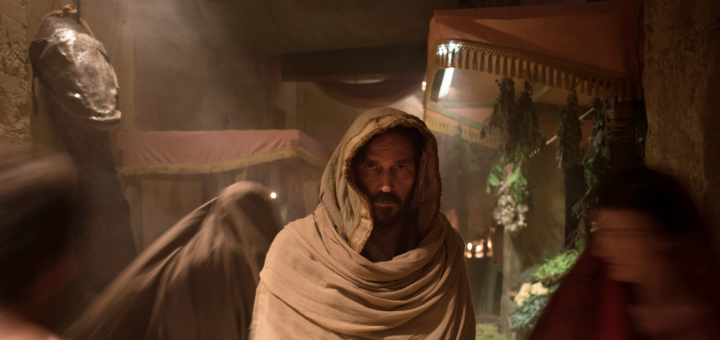
 L to R: Priscilla (Joanne Whalley), Luke (Jim Caviezel), and Aquila (John Lynch) contemplate fleeing Rome in PAUL, APOSTLE OF CHRIST- in theaters March 23, 2018. © 2018 CTMG. All Rights Reserved.[/caption]
If you have been to Italy and stood in the ruins of the Roman Forum you may have visited the Mamertine Prison. This is where the Apostles Peter and Paul were imprisoned before their death. The ancient stone walkways were also walked on by Paul’s close friends Luke, Aquila, and Priscilla. In this damp, dim former cistern, Paul composed scripture shining light in a dark place. (2 Timothy 4:11)
The chain that held Paul in this prison is a relic today. You can see it at St. Paul Outside the Walls, the site of his ancient tomb. In his letter to Timothy Paul reminds us that the Word of God is not chained (2 Tim. 2:9). Paul, Apostle of Christ is a visual reminder of this truth. As the film opens, Luke arrives in Rome. His intention is to spend time with Paul to capture his wisdom.
Paul’s first time in Rome was spent under house arrest (Acts 28:16, 30; cf. Eph. 6:20). This movie begins during Paul’s second Roman imprisonment. Nero blamed the Christians for the burning of Rome (64 AD). Paul was convicted for being an influential Christian leader. In the Mamertine prison Paul wrote to Timothy, telling him, “Only Luke is here with me.” This line inspired writer and film director Andrew Hyatt’s script for Paul, Apostle of Christ. While awaiting execution, “only Luke” is with him (2 Tim. 4:11). “Luke, the beloved physician” (Col. 4:14; cf. Phil. 24).
Saints Pricilla and Aquila, an early missionary couple who are mentioned six times in the writings of Paul and Luke, are also prominent in this movie. They first met Paul in Corinth after the Jews were expelled from Rome. Later they returned to Rome. As this story opens Pricilla and Aquila are local leaders (later Aquila became Bishop of Asia) encouraging the Christian community. A persecution inflicting terrible atrocities on Christians is raging in the city.
L to R: Priscilla (Joanne Whalley), Luke (Jim Caviezel), and Aquila (John Lynch) contemplate fleeing Rome in PAUL, APOSTLE OF CHRIST- in theaters March 23, 2018. © 2018 CTMG. All Rights Reserved.[/caption]
If you have been to Italy and stood in the ruins of the Roman Forum you may have visited the Mamertine Prison. This is where the Apostles Peter and Paul were imprisoned before their death. The ancient stone walkways were also walked on by Paul’s close friends Luke, Aquila, and Priscilla. In this damp, dim former cistern, Paul composed scripture shining light in a dark place. (2 Timothy 4:11)
The chain that held Paul in this prison is a relic today. You can see it at St. Paul Outside the Walls, the site of his ancient tomb. In his letter to Timothy Paul reminds us that the Word of God is not chained (2 Tim. 2:9). Paul, Apostle of Christ is a visual reminder of this truth. As the film opens, Luke arrives in Rome. His intention is to spend time with Paul to capture his wisdom.
Paul’s first time in Rome was spent under house arrest (Acts 28:16, 30; cf. Eph. 6:20). This movie begins during Paul’s second Roman imprisonment. Nero blamed the Christians for the burning of Rome (64 AD). Paul was convicted for being an influential Christian leader. In the Mamertine prison Paul wrote to Timothy, telling him, “Only Luke is here with me.” This line inspired writer and film director Andrew Hyatt’s script for Paul, Apostle of Christ. While awaiting execution, “only Luke” is with him (2 Tim. 4:11). “Luke, the beloved physician” (Col. 4:14; cf. Phil. 24).
Saints Pricilla and Aquila, an early missionary couple who are mentioned six times in the writings of Paul and Luke, are also prominent in this movie. They first met Paul in Corinth after the Jews were expelled from Rome. Later they returned to Rome. As this story opens Pricilla and Aquila are local leaders (later Aquila became Bishop of Asia) encouraging the Christian community. A persecution inflicting terrible atrocities on Christians is raging in the city.
 L to R: Luke (Jim Caviezel) and Paul (James Faulkner) discuss recording Paul’s teachings in PAUL, APOSTLE OF CHRIST- in
L to R: Luke (Jim Caviezel) and Paul (James Faulkner) discuss recording Paul’s teachings in PAUL, APOSTLE OF CHRIST- intheaters March 23, 2018. © 2018 CTMG. All Rights Reserved.[/caption] The producer of Paul, Apostle of Christ T. J. Berden considers forgiveness one of the film’s main themes. “Paul changed from murdering Christians to becoming their unlikely leader. His life personifies ‘forgiveness,’ a concept that seems almost impossible today — but desperately needed." This film is a meditation. Much the dialogue is taken from Paul’s letters and the Acts of the Apostles. One prominent Pauline theme, being poured out as a sacrifice, threads throughout the film.
But even if I am being poured out as a libation over the sacrifice and the offering of your faith, I am glad and rejoice with all of you. (Phil. 2:17). Present your bodies as a living sacrifice, holy and acceptable to God, which is your spiritual worship. Do not be conformed to this world, but be transformed by the renewal of your mind, that by testing you may discern what is the will of God. (Romans 12:1)This theme contrasts scenes depicting libations offered to the gods. Paul reviews his life in service of Christ boasting of his weakness and the mercy of God. This confuses his Roman jailer who has a very post-modern definition of truth, “That truth is only yours.” It is an echo of Pilate’s question to Jesus: “What is truth?” Paul responds by asking his jailer if he noticed that the world is missing something. He tells him that there is grace enough for everyone. Paul knows that though we face death nothing can separate us from the love of Christ who is risen from the dead. Casting off all moorings, he will spread his sails in eternity. One of Paul’s movie prayers is “help us finish the race.” He expresses being torn between two desires: if I live, I can do more fruitful work for Christ. I also long to go and be with Christ, which would be far better for me (Phil. 1:23). A cutaway scene depicts Paul, the Christians in hiding, and the Christians destined to be martyred at Nero’s Circus praying the Our Father. They pray in order to run with endurance, to win an imperishable crown from the righteous Judge (1 Cor. 9:24).
 Luke (Jim Caviezel) enters Rome in secret to find Paul in PAUL, APOSTLE OF CHRIST- in theaters March 23, 2018. © 2018
Luke (Jim Caviezel) enters Rome in secret to find Paul in PAUL, APOSTLE OF CHRIST- in theaters March 23, 2018. © 2018CTMG. All Rights Reserved.[/caption] The film’s conclusion is my favorite. There is a healing that emphasizes Paul’s desire that each person know they are completely loved. In an earlier scene Paul recites his great ode to love, 1 Corinthians 13. The greatest ode to love is shown in the brief Eucharistic scene. Luke visits Paul in prison. They both partake of Holy Communion during what must have been a concelebrated liturgy. This is a reminder that there is no greater love than to lay down one’s life for another (cf. John 15:13). Paul reminds us that others “will know we are Christian by our love.” Jesus’ love for us is the measure of our love for each other. This film uncovers the life goal of Christians as it is revealed in Paul’s life. He sums it up in his words, “It is no longer I who live but Christ” (Gal. 2:20). A minor spoiler alert: look for St. Stephen at the beginning and end of the film. Film Facts:
- Filmed on location in Malta
- James Faulkner as Saint Paul
- Jim Caviezel as Saint Luke: “I read the Acts of the Apostles and started lifting little clues here and there, and I went to Mass and prayed on them. And then we see how he wrote, how Paul sees [Luke], and I started cross-examining him — and there is a lot of cross-examining and asking him about it — and, slowly, it starts to all come together.”
- Olivier Martinez as Mauritius, prefect of Mamertine Prison
- Joanne Whalley as Priscilla, Aquilla's wife
- John Lynch as Aquilla, Priscilla's husband
- Yorgos Karamihos as Saul of Tarsus, Paul before his conversion to Christianity.
 Visit the official Paul Movie Site. Learn more about Affirm Films.
Visit the official Paul Movie Site. Learn more about Affirm Films.
Copyright 2018 Sr. Margaret Kerry, fsp
About the Author

Sr. Margaret Kerry, fsp
A Daughter of St. Paul for 40 years Sr. Margaret continues to pursue new ways to proclaim the Gospel: sharing the Pauline Charism with the laity, writing books (St. Anthony of Padua: Fire & Light; Strength in Darkness: John of the Cross; Prayers for the New Evangelization), & through direct evangelization. She is available for workshops on the Vocation & Mission of the Laity, Media Literacy, and The New Evangelization. mkerry@paulinemedia.com


.png?width=1806&height=731&name=CatholicMom_hcfm_logo1_pos_871c_2728c%20(002).png)
Comments